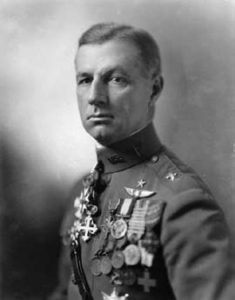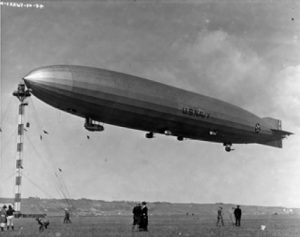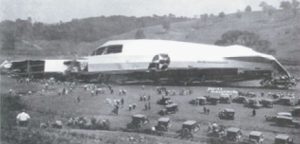By Marty Maisel
Challenging the Army

USAF
Although the Navy was embracing aviation, the results of the 1921 war games had little effect on the Army. But Billy Mitchell, besides being reported to be “vain, ill-tempered, racist, overbearing, arrogant and egotistical,” was also regarded to be committed and tenacious. To the consternation of his Army bosses he continued to press for the need to increase the development of Army aviation.
In the fall of 1923 Mitchell received orders to make an inspection tour of the Pacific. Some saw this assignment as a way for his superior officers to get him “out of their hair” for a while. Mitchell, and his new wife, visited the Hawaiian Islands, the Philippines, India, China and Japan and after his return submitted a 323-page report of his observations that would be considered to be more bizarre by his superiors than any of his previous statements.
In that 1924 report Mitchell claimed that Japan would attack the United States at Pearl Harbor, Hawaii:
“Japan knows full well that the United States will probably enter the next war with the
methods and weapons of the former War…
… the defense of the Hawaiian group is based on the island of Oahu …”
“Attack will be launched as follows: Bombardment, attack to be made on Ford Island at 7:30 a.m. Attack to be made on Clark Field
(Philippine Islands) at 10:40 a.m. The (Japanese) air force would then carry out a systematic siege against Corregidor.”
“The United States must not render herself completely defenseless on the one hand thinking that a war with Japan is an impossibility, and on the other by sticking to methods and means of making war as obsolete as the bow and arrow…”
Mitchell’s 1924 report was filed away and his continuing conflicts with his superiors resulted in his not being reappointed to Assistant Air Chief when his term expired in 1925 and a demotion to the rank of Colonel. In addition Mitchell was assigned to a post at Fort Sam Houston, Texas – far from his contacts in Congress and far from the center of Army power.
The Shenandoah

Rigid Navy Airship USS Shenandoah at NAS San Diego. (Image from the San Diego Air Museum is in the public domain)
One of Mitchell’s concerns was flight safety. Mitchell stated that training and equipment in the Army and Navy air services was inadequate and he shared his concern with his friend, Zachary Landsdowne, Commander of the Navy’s dirigible Shenandoah.
In the summer of 1925 Admiral Moffett ordered the Shenandoah to conduct a tour of the country to gain public support, needed for future funding of the Navy’s aviation assets. Commander Zachary Landsdowne, confided to Mitchell that he was concerned about the “county fair” tour – but would follow orders.
On Sept. 2, 1925 the Shenandoah headed toward the mid-west over the Allegheny mountains into a developing storm. Engine failures resulted in an uncontrolled climb and, at an altitude of over 6000 ft, the Shenandoah came apart. Fourteen crew members died, including Landsdowne.

Crash site of the Navy airship Shenandoah, Noble County, Ohio. (U.S. Navy photo is in the public domain)
Mitchell’s Response
Billy Mitchell could not stay silent about the needless loss of the Shenandoah and its crew. He summoned local reporters to his office and
issued the following statement:
“About what happened, my opinion is as follows: These accidents (apparently referring to the Shenandoah and other military aviation
accidents) are the direct result of the incompetency, criminal negligence and almost treasonable administration of the national defense by the Navy and War Departments… The bodies of my former companions of the air molder under the soil in America and Asia, Europe and Africa, many, yes, a great many, sent there directly by official stupidity.”
Mitchell’s statement accusing his superiors of “incompetence” “stupidity,” and “almost treasonable” actions received a lot of attention in the press. President Calvin Coolidge himself ordered Mitchell’s court–martial under charges of insubordination in accordance with the 96th Article of War – specifically “conduct of a nature to bring discredit on the military service.”
